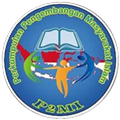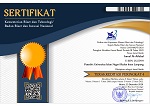OPTIMALISASI PENGELOLAAN ZAKAT PRODUKTIF SEBAGAI REALISASI REVOLUSI MENTAL
Abstract
This research is based on the problem of poverty and unemployment. Poverty in Indonesia according to the Central Statistics Agency Report in September 2017 reached 26.58 million people. In Islam, poverty is a social responsibility that needs to be considered, one of which is through zakat. Zakat will be more meaningful if it increases economic empowerment for its recipients. For this reason, a mental revolution is needed for each element of zakat. Mental revolution is applied in the form of instilling the values of integrity, work ethic and mutual cooperation to the three elements of zakat namely muzakki, amil zakat and Mustahik. This research is a library research. Based on primary data sources and secondary sources. Data processing by editing, organizing, finding research results, analyzed and drawn conclusions. Through collecting data or scientific papers that aim with the object of research that is library. Research results show that with the mental revolution movement on the three elements of zakat, the welfare and independence of the people will be realized so that it will reduce poverty in Indonesia.
Keywords
Full Text:
PDFReferences
Ahmad Mustafa Al-Maraghi, Tafsîr al-Marâghî, Mesir: Musthafa al-Bab al-Halabi, 2006
Badan Pusat Statistik, Persentase Penduduk Miskin September 2017 Mencapai 10, 12 Persen, (https://www.bps.go.id/pressrelease, diakses pada 2 Juli 2019)
Departemen Agama RI, Al-Qur’an dan Terjemahnya, Jakarta: Bumi Restu, 1974.
Ditjen Bimas Islam Kemenag RI, Fiqh Zakat, Jakarta: Kemenag, 1983
Ditjen Bimas Islam Kemenag RI, Jurnal Bimas Islam, Jakarta: Kemenag, 2014.
Ditjen Bimas Islam Kemenag RI, Membangun Peradaban Zakat. Jakarta: Kemenag, 2012
Ditjen Bimas Islam Kemenag RI, Petunjuk Teknis Evaluasi dan Pelaporan LPZ. Jakarta: Kemenag, 2012
Fadhil, Ahmad, Fiqh Sunnah Kontemporer Abdullah bin al-Muthlaq. Jakarta: Sahara Publisher.
Harun, Salman, Hukum Zakat Yusuf Qardawi. Bandung: Mizan, 1988.
Ibnu Bathal, Alî bin Khalaf, Kitab Syarah Shahîh Bukhârî, Riyâdh:
Maktabah al-Rasyîd, 2008
Imam Al-Qurthûbî, Tafsir al-Qurthûbî, Jakarta: Pustaka Azam, 2000
Kemenko, Revolusi Mental, Jakarta, 2015
Risya, Subki, Zakat Untuk Pengentasan Kemiskinan. Jakarta: PP Lazis NU, 2009
Shihab, M. Quraish, Tafsir Al Misbah: Pesan, Kesan dan Keserasian Al-Qur’an. Jakarta: Lentera Hati, 2002
Siradj, Mustolih, Jalan Panjang Legislasi Syariat Zakat di Indonesia: Studi Terhadap Undang-Undang Nomor 23 Tahun 2011 Tentang Pengelolaan Zakat, Jurnal BIMAS Islam Volume 7 Nomor 3. Jakarta: Kemenag, 2014
Taghreed al-Khalid and Muftah H. El-Naas, Organic Contaminants in Refinery Wastewater: Characterization and Novel Approachesfor Biottreatment, in “Recent Insights in Petroleum Science and Engineering,” Croatia: Janeza Trdline, 2018
Taslim, Anshori, Fikih Imam Syafi'i. Jakarta: Pustaka Azzam, 2004.
Tasmara, Toto, Membudayakan Etos Kerja Islami. Depok: Gema Insani, 2002.
DOI: http://dx.doi.org/10.24042/ijpmi.v13i1.6466
Refbacks
- There are currently no refbacks.
Jurnal Ijtimaiyya is licensed under a Creative Commons Attribution-ShareAlike 4.0 International License.





1.png)
11.png)
.png)



